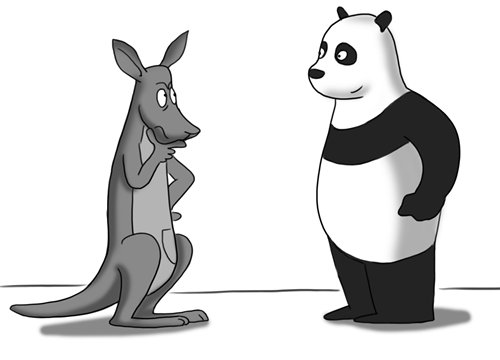
Illustration: Liu Rui/GT
"In the end, the things that bind nations together more tightly than trade or even iron ore and coal are, of course, common values." The words of former Australian prime minister John Howard are classic in their evaluation of China-Australia relations. But now it may sound more appropriate to say that if two nations don't share common values, their trade and other forms of economic cooperation will be harmed.
Earlier this year, Australia rejected China's Belt and Road initiative. Before that, it had tightened management of foreign investment, and rejected a bid by the State Grid Corporation of China to purchase Australia's biggest energy grid Ausgrid.
The Chinese-owned Landbridge's acquisition of ports, land and buildings in Darwin has also raised controversy. Some Australians protested against companies backed by the Chinese government and State-owned banks purchasing important infrastructure in their country.
In addition, the Australian government established a Critical Infrastructure Center in January to undertake assessments of sensitive federal-owned, state-owned and privately-owned assets. The agency was built out of Australia's concern over the recent flood of Chinese investment.
The concerns are ostensibly targeted against Chinese investment. However, they are rooted in suspicion about China's political system and its State-owned enterprises (SOE) that are bred in the system. The US and European countries have similar concerns over such investment.
What's unique about Australia is that it is an Oceanic country close to China. Geographically Australia is not an Asian country, but it is always considered to be so, together with New Zealand.
This geographical advantage has brought many benefits to Australia. In fact, a rapidly growing China has become an important driving force for Australia's economic development.
The China-Australia Free Trade Agreement entered into force in December 2015 and brought about significant tariff reductions. Australia's exports of wine, seafood and fruit to China were boosted significantly. Chinese tourists have become the biggest income source of Australia's tourism industry. China has become Australia's biggest trading partner.
But in the meantime, China's rise has frequently tipped the balance that Canberra wants to maintain by virtue of Washington's strength. Asia's development, driven by China, switched off any possibility of returning to the international landscape of the 20th century. Australia must find a way to get along with China.
In fact, it was during the period of quick development in China and other Asian countries that people increasingly started to consider Australia an Asian country. This certainly gets on Australia's nerves, a country mainly populated by immigrants from Europe. But this sentiment is adjustable.
The discomfort can be reduced to a choice: whether Australia should hold fast to its past or face up to the future. How to learn about and get on with China is a problem that Australia must solve. It can no longer follow the path it trod in the last century. Australia's geographical position dictates that it must work out this problem earlier than other Western countries.
From a different perspective, why couldn't Australia turn its proximity to China into an asset? If the Western country can be sensitive enough to realize the changing position of China and Asia in the 21st century, and that Asian countries are making headway in an irreversible trend, common values would be no big deal in binding the two countries.
It's not impossible to find other ways to bind China and Australia more tightly than trade or ore. In fact, as long as the two countries can update their understanding of each other with mutual respect and enhance their interactions, they will be able to consolidate a foundation for seeking consensus, that is, common destiny.
The author is a senior editor with the People's Daily, and currently a senior fellow with the Chongyang Institute for Financial Studies at Renmin University of China. dinggang@globaltimes.com.cn. Follow him on Twitter @dinggangchina

